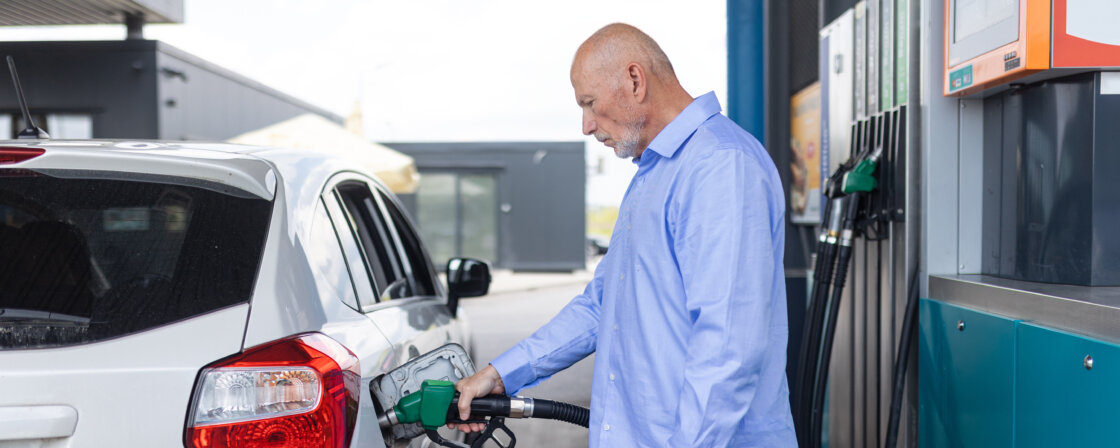In this article we explain how the price of fuel is composed, what the current excise duty rates are, how VAT works and when companies can claim a VAT deduction on fuel.
What the pump price consists of
The final pump price is the sum of the following parts:
- Base (excluding taxes) – includes the purchase price (the effect of world oil/product prices and the exchange rate of the crown), refinery margin, mandatory bio-components, logistics (terminals, tankers), wholesale and retail margin. These components vary according to markets, exchange rates and competition.
- Excise duty – this is a fixed amount per unit (for petrol and diesel per 1,000 litres, for LPG per tonne, for CNG per unit of energy). In the Czech Republic, the following rates are currently in force: petrol 12,840 CZK/1,000 litres, diesel 9,950 CZK/1,000 litres, LPG for transport 3,933 CZK/t and CNG for transport is taxed at 264.80 CZK/MWh of combustion heat (in practice, however, this is not an excise duty but an energy tax). This translates into approximately CZK 12.84/l for petrol and CZK 9.95/l for diesel, approximately CZK 2.15/l for LPG and approximately CZK 2.8/m³ for CNG.
- VAT (value added tax) – is 21% of the sum of the base + excise duty – VAT is therefore calculated not only on the fuel itself, but also on the excise duty already included. The basic rate of VAT in 2025 is 21%, while the reduced rate of 12% does not apply to fuels.
Are you solving a similar problem?
Tax legal advice
Not sure how to do your taxes correctly so you don’t get it wrong? We can help you navigate the law, whether it’s dealing with a specific tax situation, preparing for an audit by the tax authority or defending yourself in court.
I want to help
- When you order, you know what you will get and how much it will cost.
- We handle everything online or in person at one of our 6 offices.
- We handle 8 out of 10 requests within 2 working days.
- We have specialists for every field of law.
Current rates and what they mean for excise duty on petrol or diesel
Excise duty on petrol and diesel is fixed per litre regardless of the market price. So in practice, even if the world oil price falls, the excise duty per litre remains the same. In the Czech Republic, after the end of the temporary relief for diesel in 2023, the rates have stabilised at CZK 12.84 per litre for petrol and CZK 9.95 per litre for diesel.
For LPG and CNG, the burden is much lower, which is a deliberate policy to encourage alternative fuels. The European minimum for these products is also lower than for liquid fuels.
How much does a litre of petrol and diesel actually cost today
For illustrative purposes, we use the current average prices for the Czech Republic as of 20 October 2025:
petrol (Natural 95) 34.37 CZK/l, diesel 33.28 CZK/l.
Price breakdown – petrol
- Final price: 34.37 CZK/l.
- VAT: calculated from (base + excise duty). First, let’s remove the VAT: price without VAT = 34,37 / 1,21 ≈ 28,41 CZK/l.
- Excise duty on petrol: 12,84 CZK/l.
- Base without taxes (refinery, logistics, bio-ingredients, margin): 28,41 – 12,84 ≈ 15,56 CZK/l.
These figures show that taxes account for around half of the price of petrol (the sum of excise duty and VAT recalculated from the final price).
Price breakdown – diesel
- Final price: 33,28 CZK/l.
- Price excluding VAT: 33.28 / 1.21 ≈ 27.51 CZK/l.
- Diesel excise duty: CZK 9,95/l.
- Basis without taxes: 27,51 – 9,95 ≈ 17,56 CZK/l.
Diesel has a lower excise duty than petrol, so the tax share of the total price is slightly lower.
Price of diesel without VAT
If you need to know the price of diesel without VAT, the procedure is always the same: divide the final price by 1.21 (21% VAT applies in 2025) to get the price without VAT. If you want to go further and differentiate between the price without VAT and the price without excise duty, deduct the fixed excise duty (9.95 CZK/l). In the same way, for petrol you deduct 12.84 CZK/l.
Deduction of VAT on fuel for companies
For VAT payers, fuel is a commodity charged at the standard rate of 21%, and VAT can be deducted if the fuel is used for economic activity (typically business vehicles). Good practice means a proper tax document (receipt/invoice with details), accounting and proof of connection with taxable transactions. If the vehicle is also used outside the economic activity or for exempt transactions without deduction, a proportional or reduced deduction is applied – i.e. not always 100%.
For non-VAT payers (typically tradesmen outside the VAT regime), VAT remains part of the cost. In terms of excise duty, there is no separate deduction – excise duty is included in the price of the fuel and is a final cost. However, there are special excise duty refunds for specific purposes (e.g. so-called green diesel in agriculture).
Tip for article
What are the obligations of VAT payers and non-payers and how do they differ? The next article will tell you.
Note to employers: the reference fuel prices for travel allowances (published for business travel purposes) are not the same as market prices at the pump – they are administrative averages for calculating allowances. These amounts are published annually by the state in conjunction with the labor rules.
CNG excise duty and LPG excise duty: why gases are taxed differently
LPG (liquefied petroleum gas) and CNG (compressed natural gas) are taxed significantly less than petrol or diesel.
- LPG: CZK 3 933/t, converted to approx. CZK 2.15/l.
- CNG: 264,80 CZK/MWh of calorific value – at normal calorific value this corresponds to approximately 2,8 CZK per 1 m³ of CNG. However, CNG is not an excise duty, but a special tax on natural gas.
The reason for the lower taxation of gases is the EU and Czech policy supporting alternative and lower-emission fuels.
Why prices change even with the same taxes
Although the excise duty is fixed, the final price fluctuates according to other influences:
- World oil and petroleum product prices. Oil is traded in dollars, so global changes are reflected in Czech fuel prices with a short lag.
- The exchange rate of the koruna against the dollar. A weaker krona makes imports more expensive and increases the krona price of products even if the dollar price does not rise.
- Refining and distribution margins. Margins are not fixed – they vary over time, according to local competition and the type of network (international brands, state-owned EuroOil/CEPRO, local pumps, etc.).Thus, in addition to global prices and taxes, the competitive setup of the retail market – different purchasing channels, wholesale contracts, density of pumps in the region and marketing strategies – all contribute to the outcome.
- Mandatory bio-ingredients. It is mandatory to blend bio-based ingredients into petrol and diesel. Their price and availability also drive the tax-free base.
- Changes in supply routes. In 2025, the Czech Republic announced to achieve full independence from Russian oil by increasing the capacity of the TAL pipeline (about 8 million t/year). This increases security of supply; however, final prices continue to reflect world markets.
What to expect: when can taxes change the price?
Excise duty on fuel can only be changed by the government by amending the law; VAT can be changed by changing tax rates. In 2025, the VAT rate for fuels remains unchanged (still 21% in the standard rate), with more significant tax changes this year elsewhere (e.g. alcohol). Thus, normal fluctuations in fuel prices in 2025 are due to market factors.
Summary
The fuel price is made up of three components: a variable base (fuel purchase, refining, biobased components, logistics and margin), a fixed excise duty and a VAT of 21% calculated on the base + excise duties. In 2025, the excise duty will be about 12.84 CZK/l for petrol and 9.95 CZK/l for diesel (LPG and CNG have significantly lower taxation). VAT payers can claim a deduction for fuels as long as they are used for economic activity and have the proper proof; excise duty is not deducted (exceptions exist only for special schemes such as “green diesel”).
Although the excise duty per litre is fixed, final prices fluctuate according to world oil and product prices, the exchange rate of the Crown, margins, bio-based ingredients and changes in supply; in 2025, VAT on fuels remains at 21% and there are no major tax changes on fuels. To quickly calculate the price without VAT, simply divide the final price by 1.21; for a base without any taxes, subtract the excise duty from this amount.
Frequently Asked Questions
Does the excise tax change with the price of oil?
No. It’s fixed per unit. When oil becomes cheaper, VAT in crowns drops because it is calculated proportionally but excise per litre remains.
Can I deduct excise duty as an entrepreneur?
No. The deduction applies if you use the fuel for economic activity and you have a tax receipt. Excise duty is the final part of the price.
Why is fuel more expensive on the highway than in the city?
Because higher operating costs and higher margins are reflected in the tax-free base in a less competitive environment. Taxes are the same, it is the market part of the price that differs.
Does the excise duty vary by octane number (E5/E10) or cetane number?
It doesn’t. The rate for petrol and diesel is fixed per 1 000 litres regardless of octane/ cetane; differences between E5/E10 are only reflected in the base purchase price.
Can the pump margin be calculated from public data?
Exactly not. Taxes and final price are known; the “base” includes both purchase price and logistics, as well as wholesale and retail margins, which change continuously.
Does domestic CNG (boiler gas) have a different tax than CNG as a car fuel?
Yes. Heating gas and vehicle gas are taxed under different rules.




